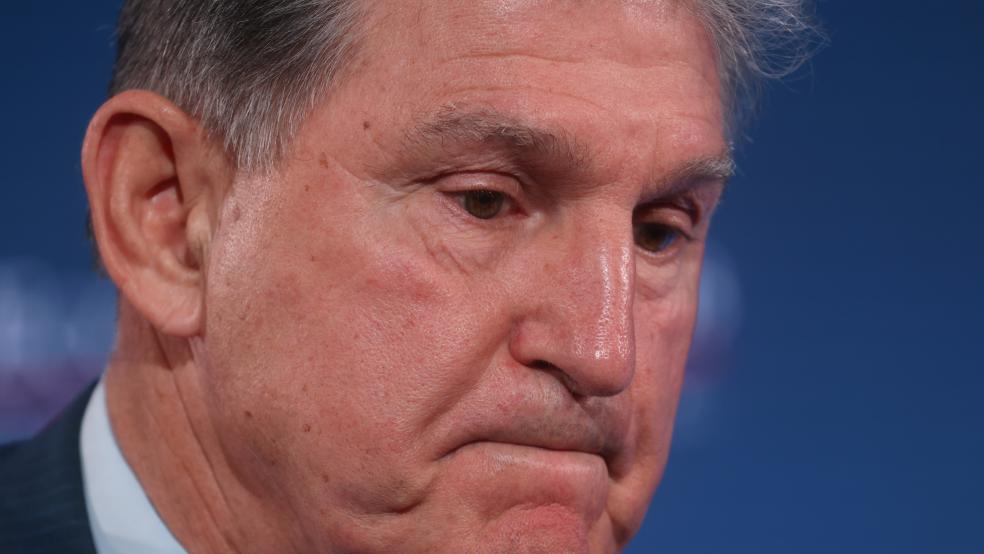Democrats’ plans to resurrect some version of their Build Back Better social spending and climate package already appeared to be hanging by a thread, with some in the party acknowledging that they might have to shelve the roughly $1.7 trillion plan indefinitely while Congress turns to other items that will fill up the calendar for months. Thursday’s inflation report likely snipped a few more strands from that thread, making it even less likely that Democrats will be able to scrounge up the votes they’d need to pass a large and ambitious spending bill along the lines many in the party had envisioned.
Sen. Joe Manchin (D-WV), who effectively killed the last version of the Build Back Better Act when he announced in December that he couldn’t support it, on Thursday reiterated his concerns about inflation and his view that now is not the time for sweeping government spending plans.
“For months, I have been ringing the alarm bell about inflation. Once again, we are witnessing that the threat of inflation is real,” Manchin said in a statement. “It’s beyond time for the Federal Reserve to tackle this issue head on, and Congress and the Administration must proceed with caution before adding more fuel to an economy already on fire. As inflation and our $30 trillion in national debt continue a historic climb, only in Washington, DC do people seem to think that spending trillions more of taxpayers’ money will cure our problems, let alone inflation.”
The Biden administration and other Democrats have argued that inflation is projected to ease in the coming months and that their plan would help combat price increases by cutting the cost of prescription drugs and child care. They cite the views of 17 Nobel Prize-winning economists who said in September that the inflationary effect of the spending and tax package as it was constructed then “will be at most negligible.”
What Manchin wants: Democrats are reportedly considering ways to salvage elements of their sweeping plan, and Manchin on Thursday indicated in an interview with Hoppy Kercheval of WVMetroNews that he remains open to hiking tax rates on corporations and the wealthy, allowing Medicare to negotiate drug prices, raising the Social Security payroll tax cap and some spending on climate programs. He emphasized, though, that that government must bring down the national debt. “There’s a lot of good, well-intentioned ideas in there that we need to tackle sooner or later, but the bottom line is we’re not in a financial position to do it,” Manchin said of the Build Back Better plan. “Let’s get a tax bill that really puts us on the path to financial solvency.”
Manchin’s view “is more akin to a deficit-reduction package than one that ushers in the massive climate funding and changes to the social safety net that Democrats once envisioned,” Politico’s Burgess Everett writes. “Rather than start with spending priorities and then evaluating how to pay for them, Manchin wants to start with tax reform as the goal of any party-line effort. He’s also insisting that social programs go through typical committee consideration, which allows Republicans more input. And he doesn’t just want it fully paid for; he wants it to significantly cut the deficit and put debt on a ‘downward trajectory.’”
The bottom line: Democrats’ best hopes may be in crafting a deficit-reduction bill that addresses some of their priorities. “My hunch is that our only path forward is a bill that is fully paid for, frankly that generates additional revenue that can be used to reduce the debt and deficits, and that directly reduces consumer prices,” said Senator Chris Coons (D-DE), according to Bloomberg.
Yet Manchin’s vision would likely face a host of challenges, too. Sen. Kyrsten Sinema (D-AZ) blocked a previous plan to raise tax rates, for example, and would likely be an obstacle to ending the carried interest loophole that Manchin wants to close. A 28% capital gains tax rate and Medicare drug-price negotiating power would also face some resistance. Democrats may still look to put together some kind of reconciliation package, but the process could well take months — and Thursday’s inflation numbers only reinforced Manchin’s concerns, highlighting how difficult the path forward will be.
Budget
Manchin’s Inflation Concerns Dampen Dem Hopes for Major Spending Plan

Reuters/Leah Millis




